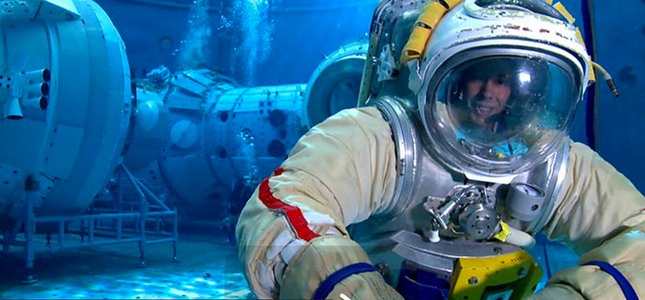
The first show in the five part series aired on Tuesday the 7th October, and as you’ll probably expect if you’ve seen any of the previous shows, it was a fascinating insight into the science behind the origins and very existence of humanity. The first episode was called Apeman – Spaceman, charting a whistle stop tour of human evolution from homo erectus to our modern-day, space walking sapien species and it was a great introduction to all of the different fields of scientific study that have gone into shaping our understanding of this process.
In all fairness, it was one hell of a lot to cover in an hour long episode, with everything from biology, ecology, anthropology, geology, astronomy, mathematics and physics all in the mix. While there’s definitely a feeling of not having enough time to delve into the detailed elements of science that are involved in explaining the journey, there’s more than enough to pique the interests of science geeks no matter what their level of expertise.
Like David Attenborough’s incredible BBC documentaries, the production synergy that goes into constructing Human Universe is phenomenal. Great visuals combine with perfectly pitched music and sound to deliver a genuinely awe inspiring experience, which is added to by the brilliant narration and timing of Professor Brian Cox, who is in full command of his knowledge base to evoke the staggering scale and reality of human existence.
The enthusiasm that he has every step of the way is as captivating as ever, whether he’s explaining the atmosphere ellipsis transition phases that cause climate changes in Africa’s Rift Valley or the associated brain development of our great ape ancestors that occurred there during periods of significant change. It may not give you all of the answers, or enough detail to fully understand the situation, but it will light a fire in you to learn more about the topics covered, making it a great source of scientific inspiration.
The only real negative in terms of Cox’s part in the series is that he’s got a small tendency to become overly incredulous about the wonders of science, using the term “can you believe it” a bit too much for our liking. To answer the question here and now, “yes Bri, we can believe it, science is a wonder, but it’s a lot less mind twisting than the existence of fairies, Santa Clause or significant deities like Thor and Zeus. We’re fine with incredulity when it’s appropriate, like when he flippantly commented in an episode of Wonders Of The Universe that moments after the Big Bang the known universe was the size of a grain of rice (head literally mashed), but on the whole, most of it we’re quite comfortable with.
That, however, takes little away from the overall genius of the show, which swirls up the scientific interest of pretty much every viewer with even a passing interest in science, life or the snow fields of Kazakhstan.
Human Universe review: 4.1/5
Human Universe episode guide:
1. Apeman – Spaceman
Air date: 7th October 2014
The first episode starts out in the birthplace of humanity, in Ethiopia, Africa as Professor Brian Cox looks into how the universe contributed to the evolutionary process that has taken up from apeman to spaceman. Highlighting the key development of our hominid ancestors and linking them to periods of environmental disturbances in the Rift Valley due to the Earth’s orbital variations he makes a powerful case for the impact of celestial movements on our very existence. He also pays a visit to the ancient city of Petra in Jordan, where he talks about how our bigger brain predecessors gathered together to form the civilizations needed to eventually bring us to our spaceman explorers. Finally, he literally swoons with excitement at being lucky enough to get involved in the Russian cosmonaut program by having a go at the underwater space training and accompanying the team to Kazakhstan to watch the return of astronauts from the International Space Station.
2. Why Are We Still Here?
Air date: 14th October 2014
The second episode sees Bri uncovering the chance events and laws of physics that have combined to result in our presence on Earth. He also gets about radical in terms of his explanation of why we’re here and why the universe has the right component parts for our very being.
3. Are We Alone?
Air date: 21st October 2014
Things go all X-Files in the third episode as the professor looks at the existing evidence and latest scientific research in an attempt to answer the age old question, are we alone.
4. Where Are We?
Air date: 28th October 2014
It’s a random sort of question to use for a science documentary, but it’s definitely not an early warning sign of a lack of directional prowess on the part of the Prof. Instead it will see the physicist shedding light on our place in the known universe and how we got here.
5. What Is Our Future?
Air date: 4th November 2014
The final episode in the series turns its attention to futurology to try to second guess the potential next steps in the ongoing development of humanity. Further space flight, leaving our own solar system, brain development, hover cars, new pizza toppings, they’re all potential musings for the former D: Ream keyboard tinkler.


